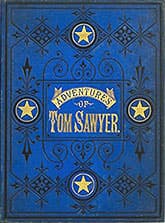The Adventures of Tom Sawyer
 First edition
First editionAlso known as
Tom Sawyer
First publication
1876
Literature form
Novel
Genres
Literary, adventure, satire, children's literature
Writing language
English
Author's country
United States
Length
Approx. 70,500 words
Notable lines
"Tom!
No answer.
"Tom!"
No answer.
"What's gone with that boy, I wonder? You Tom!"
No answer.
The old lady pulled her spectacles down and looked over them about the room; then she put them up and looked out under them.
— First lines
He had discovered a great law of human action, without knowing it — namely, that in order to make a man or a boy covet a thing, it is only necessary to make the thing difficult to obtain.
If he had been a great and wise philosopher, like the writer of this book, he would now have comprehended that Work consists of whatever a body is obliged to do, and that Play consists of whatever a body is not obliged to do.
The boys dressed themselves, hid their accoutrements, and went off grieving that there were no outlaws any more, and wondering what modern civilization could claim to have done to compensate for their loss. They said they would rather be outlaws a year in Sherwood Forest than President of the United States forever.
There were some that believed he would be President, yet, if he escaped hanging.
There was no getting around the stubborn fact that taking sweetmeats was only "hooking," while taking bacon and hams and such valuables was plain simple stealing — and there was a command against that in the Bible. So they inwardly resolved that so long as they remained in the business, their piracies should not again be sullied with the crime of stealing.
To promise not to do a thing is the surest way in the world to make a body want to go and do that very thing.
"The widder's good to me, and friendly; but I can't stand them ways. She makes me get up just at the same time every morning; she makes me wash, they comb me all to thunder; she won't let me sleep in the woodshed; I got to wear them blamed clothes that just smothers me, Tom; they don't seem to any air git through 'em, somehow; and they're so rotten nice that I can't set down, nor lay down, nor roll around anywheres; I hain't slid on a cellar-door for—well, it 'pears to be years; I got to go to church and sweat and sweat—I hate them ornery sermons! I can't ketch a fly in there, I can't chaw. I got to wear shoes all Sunday. The widder eats by a bell; she goes to bed by a bell; she gits up by a bell—everything's so awful reg'lar a body can't stand it."
Some day it may seem worth while to take up the story of the younger ones again and see what sort of men and women they turned out to be; therefore it will be wisest not to reveal any of that part of their lives at present.
— Last lines

